Leadership: Personal Values, Defining Moments, and Action
VerifiedAdded on 2023/01/18
|5
|2112
|54
Essay
AI Summary
This essay examines the crucial role of leadership in translating personal values into decisive actions within the business world. It delves into the concept of 'character' as developed through difficult decision-making processes, highlighting the significance of internships and discipline in shaping effective leaders. The essay explores the distinction between ethical decisions and defining moments, emphasizing that the latter involve choices between equally valid ideals. It identifies three types of defining moments: those related to personal identity, those concerning both personal and professional identity, and those impacting the company's identity within society. The essay stresses the importance of self-reflection, ethical considerations, and considering the broader impact on teams and stakeholders when navigating these moments. Ultimately, it underscores the need for leaders to balance their personal values with practical actions, ensuring alignment between their beliefs and their company's reputation.
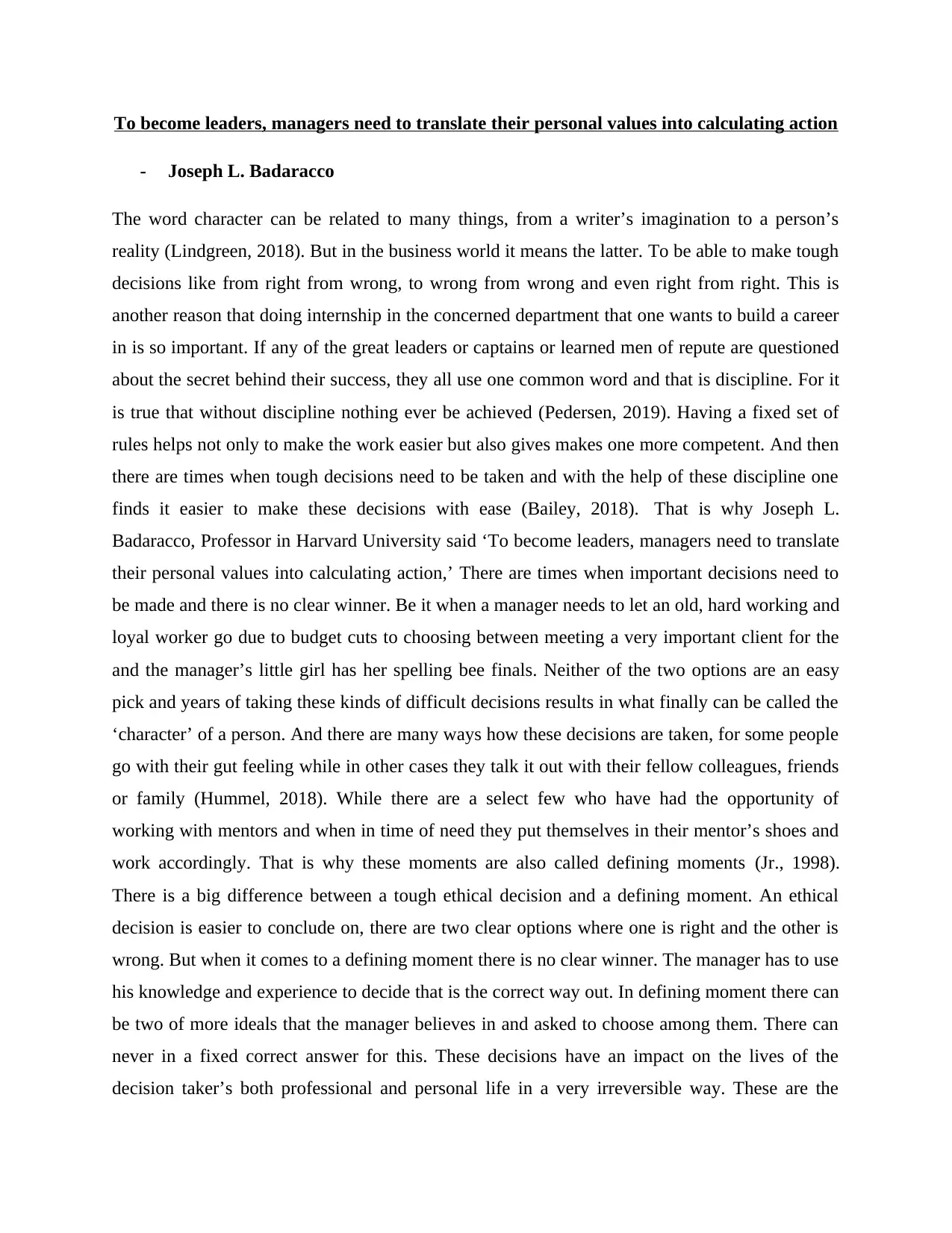
To become leaders, managers need to translate their personal values into calculating action
- Joseph L. Badaracco
The word character can be related to many things, from a writer’s imagination to a person’s
reality (Lindgreen, 2018). But in the business world it means the latter. To be able to make tough
decisions like from right from wrong, to wrong from wrong and even right from right. This is
another reason that doing internship in the concerned department that one wants to build a career
in is so important. If any of the great leaders or captains or learned men of repute are questioned
about the secret behind their success, they all use one common word and that is discipline. For it
is true that without discipline nothing ever be achieved (Pedersen, 2019). Having a fixed set of
rules helps not only to make the work easier but also gives makes one more competent. And then
there are times when tough decisions need to be taken and with the help of these discipline one
finds it easier to make these decisions with ease (Bailey, 2018). That is why Joseph L.
Badaracco, Professor in Harvard University said ‘To become leaders, managers need to translate
their personal values into calculating action,’ There are times when important decisions need to
be made and there is no clear winner. Be it when a manager needs to let an old, hard working and
loyal worker go due to budget cuts to choosing between meeting a very important client for the
and the manager’s little girl has her spelling bee finals. Neither of the two options are an easy
pick and years of taking these kinds of difficult decisions results in what finally can be called the
‘character’ of a person. And there are many ways how these decisions are taken, for some people
go with their gut feeling while in other cases they talk it out with their fellow colleagues, friends
or family (Hummel, 2018). While there are a select few who have had the opportunity of
working with mentors and when in time of need they put themselves in their mentor’s shoes and
work accordingly. That is why these moments are also called defining moments (Jr., 1998).
There is a big difference between a tough ethical decision and a defining moment. An ethical
decision is easier to conclude on, there are two clear options where one is right and the other is
wrong. But when it comes to a defining moment there is no clear winner. The manager has to use
his knowledge and experience to decide that is the correct way out. In defining moment there can
be two of more ideals that the manager believes in and asked to choose among them. There can
never in a fixed correct answer for this. These decisions have an impact on the lives of the
decision taker’s both professional and personal life in a very irreversible way. These are the
- Joseph L. Badaracco
The word character can be related to many things, from a writer’s imagination to a person’s
reality (Lindgreen, 2018). But in the business world it means the latter. To be able to make tough
decisions like from right from wrong, to wrong from wrong and even right from right. This is
another reason that doing internship in the concerned department that one wants to build a career
in is so important. If any of the great leaders or captains or learned men of repute are questioned
about the secret behind their success, they all use one common word and that is discipline. For it
is true that without discipline nothing ever be achieved (Pedersen, 2019). Having a fixed set of
rules helps not only to make the work easier but also gives makes one more competent. And then
there are times when tough decisions need to be taken and with the help of these discipline one
finds it easier to make these decisions with ease (Bailey, 2018). That is why Joseph L.
Badaracco, Professor in Harvard University said ‘To become leaders, managers need to translate
their personal values into calculating action,’ There are times when important decisions need to
be made and there is no clear winner. Be it when a manager needs to let an old, hard working and
loyal worker go due to budget cuts to choosing between meeting a very important client for the
and the manager’s little girl has her spelling bee finals. Neither of the two options are an easy
pick and years of taking these kinds of difficult decisions results in what finally can be called the
‘character’ of a person. And there are many ways how these decisions are taken, for some people
go with their gut feeling while in other cases they talk it out with their fellow colleagues, friends
or family (Hummel, 2018). While there are a select few who have had the opportunity of
working with mentors and when in time of need they put themselves in their mentor’s shoes and
work accordingly. That is why these moments are also called defining moments (Jr., 1998).
There is a big difference between a tough ethical decision and a defining moment. An ethical
decision is easier to conclude on, there are two clear options where one is right and the other is
wrong. But when it comes to a defining moment there is no clear winner. The manager has to use
his knowledge and experience to decide that is the correct way out. In defining moment there can
be two of more ideals that the manager believes in and asked to choose among them. There can
never in a fixed correct answer for this. These decisions have an impact on the lives of the
decision taker’s both professional and personal life in a very irreversible way. These are the
Paraphrase This Document
Need a fresh take? Get an instant paraphrase of this document with our AI Paraphraser
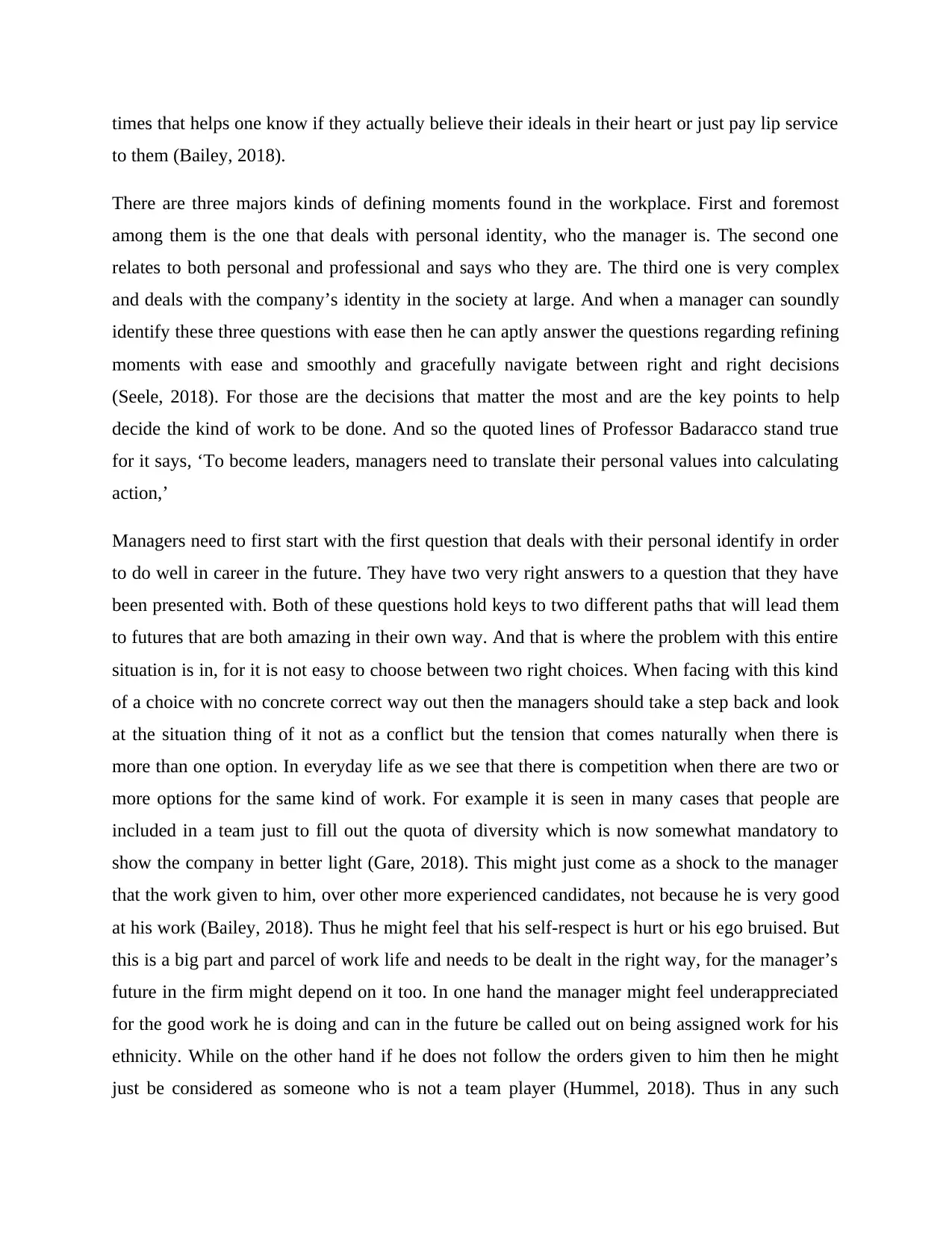
times that helps one know if they actually believe their ideals in their heart or just pay lip service
to them (Bailey, 2018).
There are three majors kinds of defining moments found in the workplace. First and foremost
among them is the one that deals with personal identity, who the manager is. The second one
relates to both personal and professional and says who they are. The third one is very complex
and deals with the company’s identity in the society at large. And when a manager can soundly
identify these three questions with ease then he can aptly answer the questions regarding refining
moments with ease and smoothly and gracefully navigate between right and right decisions
(Seele, 2018). For those are the decisions that matter the most and are the key points to help
decide the kind of work to be done. And so the quoted lines of Professor Badaracco stand true
for it says, ‘To become leaders, managers need to translate their personal values into calculating
action,’
Managers need to first start with the first question that deals with their personal identify in order
to do well in career in the future. They have two very right answers to a question that they have
been presented with. Both of these questions hold keys to two different paths that will lead them
to futures that are both amazing in their own way. And that is where the problem with this entire
situation is in, for it is not easy to choose between two right choices. When facing with this kind
of a choice with no concrete correct way out then the managers should take a step back and look
at the situation thing of it not as a conflict but the tension that comes naturally when there is
more than one option. In everyday life as we see that there is competition when there are two or
more options for the same kind of work. For example it is seen in many cases that people are
included in a team just to fill out the quota of diversity which is now somewhat mandatory to
show the company in better light (Gare, 2018). This might just come as a shock to the manager
that the work given to him, over other more experienced candidates, not because he is very good
at his work (Bailey, 2018). Thus he might feel that his self-respect is hurt or his ego bruised. But
this is a big part and parcel of work life and needs to be dealt in the right way, for the manager’s
future in the firm might depend on it too. In one hand the manager might feel underappreciated
for the good work he is doing and can in the future be called out on being assigned work for his
ethnicity. While on the other hand if he does not follow the orders given to him then he might
just be considered as someone who is not a team player (Hummel, 2018). Thus in any such
to them (Bailey, 2018).
There are three majors kinds of defining moments found in the workplace. First and foremost
among them is the one that deals with personal identity, who the manager is. The second one
relates to both personal and professional and says who they are. The third one is very complex
and deals with the company’s identity in the society at large. And when a manager can soundly
identify these three questions with ease then he can aptly answer the questions regarding refining
moments with ease and smoothly and gracefully navigate between right and right decisions
(Seele, 2018). For those are the decisions that matter the most and are the key points to help
decide the kind of work to be done. And so the quoted lines of Professor Badaracco stand true
for it says, ‘To become leaders, managers need to translate their personal values into calculating
action,’
Managers need to first start with the first question that deals with their personal identify in order
to do well in career in the future. They have two very right answers to a question that they have
been presented with. Both of these questions hold keys to two different paths that will lead them
to futures that are both amazing in their own way. And that is where the problem with this entire
situation is in, for it is not easy to choose between two right choices. When facing with this kind
of a choice with no concrete correct way out then the managers should take a step back and look
at the situation thing of it not as a conflict but the tension that comes naturally when there is
more than one option. In everyday life as we see that there is competition when there are two or
more options for the same kind of work. For example it is seen in many cases that people are
included in a team just to fill out the quota of diversity which is now somewhat mandatory to
show the company in better light (Gare, 2018). This might just come as a shock to the manager
that the work given to him, over other more experienced candidates, not because he is very good
at his work (Bailey, 2018). Thus he might feel that his self-respect is hurt or his ego bruised. But
this is a big part and parcel of work life and needs to be dealt in the right way, for the manager’s
future in the firm might depend on it too. In one hand the manager might feel underappreciated
for the good work he is doing and can in the future be called out on being assigned work for his
ethnicity. While on the other hand if he does not follow the orders given to him then he might
just be considered as someone who is not a team player (Hummel, 2018). Thus in any such
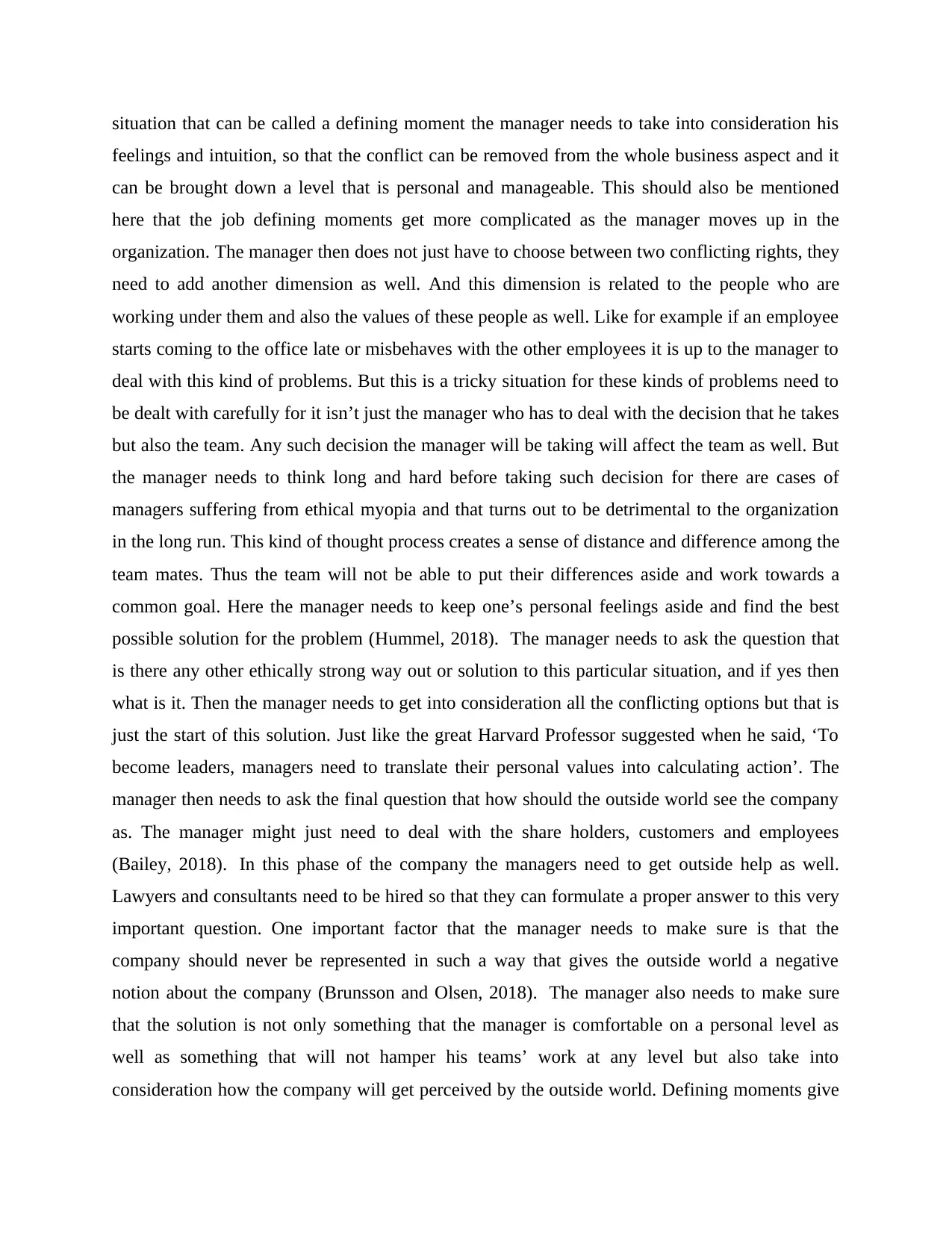
situation that can be called a defining moment the manager needs to take into consideration his
feelings and intuition, so that the conflict can be removed from the whole business aspect and it
can be brought down a level that is personal and manageable. This should also be mentioned
here that the job defining moments get more complicated as the manager moves up in the
organization. The manager then does not just have to choose between two conflicting rights, they
need to add another dimension as well. And this dimension is related to the people who are
working under them and also the values of these people as well. Like for example if an employee
starts coming to the office late or misbehaves with the other employees it is up to the manager to
deal with this kind of problems. But this is a tricky situation for these kinds of problems need to
be dealt with carefully for it isn’t just the manager who has to deal with the decision that he takes
but also the team. Any such decision the manager will be taking will affect the team as well. But
the manager needs to think long and hard before taking such decision for there are cases of
managers suffering from ethical myopia and that turns out to be detrimental to the organization
in the long run. This kind of thought process creates a sense of distance and difference among the
team mates. Thus the team will not be able to put their differences aside and work towards a
common goal. Here the manager needs to keep one’s personal feelings aside and find the best
possible solution for the problem (Hummel, 2018). The manager needs to ask the question that
is there any other ethically strong way out or solution to this particular situation, and if yes then
what is it. Then the manager needs to get into consideration all the conflicting options but that is
just the start of this solution. Just like the great Harvard Professor suggested when he said, ‘To
become leaders, managers need to translate their personal values into calculating action’. The
manager then needs to ask the final question that how should the outside world see the company
as. The manager might just need to deal with the share holders, customers and employees
(Bailey, 2018). In this phase of the company the managers need to get outside help as well.
Lawyers and consultants need to be hired so that they can formulate a proper answer to this very
important question. One important factor that the manager needs to make sure is that the
company should never be represented in such a way that gives the outside world a negative
notion about the company (Brunsson and Olsen, 2018). The manager also needs to make sure
that the solution is not only something that the manager is comfortable on a personal level as
well as something that will not hamper his teams’ work at any level but also take into
consideration how the company will get perceived by the outside world. Defining moments give
feelings and intuition, so that the conflict can be removed from the whole business aspect and it
can be brought down a level that is personal and manageable. This should also be mentioned
here that the job defining moments get more complicated as the manager moves up in the
organization. The manager then does not just have to choose between two conflicting rights, they
need to add another dimension as well. And this dimension is related to the people who are
working under them and also the values of these people as well. Like for example if an employee
starts coming to the office late or misbehaves with the other employees it is up to the manager to
deal with this kind of problems. But this is a tricky situation for these kinds of problems need to
be dealt with carefully for it isn’t just the manager who has to deal with the decision that he takes
but also the team. Any such decision the manager will be taking will affect the team as well. But
the manager needs to think long and hard before taking such decision for there are cases of
managers suffering from ethical myopia and that turns out to be detrimental to the organization
in the long run. This kind of thought process creates a sense of distance and difference among the
team mates. Thus the team will not be able to put their differences aside and work towards a
common goal. Here the manager needs to keep one’s personal feelings aside and find the best
possible solution for the problem (Hummel, 2018). The manager needs to ask the question that
is there any other ethically strong way out or solution to this particular situation, and if yes then
what is it. Then the manager needs to get into consideration all the conflicting options but that is
just the start of this solution. Just like the great Harvard Professor suggested when he said, ‘To
become leaders, managers need to translate their personal values into calculating action’. The
manager then needs to ask the final question that how should the outside world see the company
as. The manager might just need to deal with the share holders, customers and employees
(Bailey, 2018). In this phase of the company the managers need to get outside help as well.
Lawyers and consultants need to be hired so that they can formulate a proper answer to this very
important question. One important factor that the manager needs to make sure is that the
company should never be represented in such a way that gives the outside world a negative
notion about the company (Brunsson and Olsen, 2018). The manager also needs to make sure
that the solution is not only something that the manager is comfortable on a personal level as
well as something that will not hamper his teams’ work at any level but also take into
consideration how the company will get perceived by the outside world. Defining moments give
⊘ This is a preview!⊘
Do you want full access?
Subscribe today to unlock all pages.

Trusted by 1+ million students worldwide
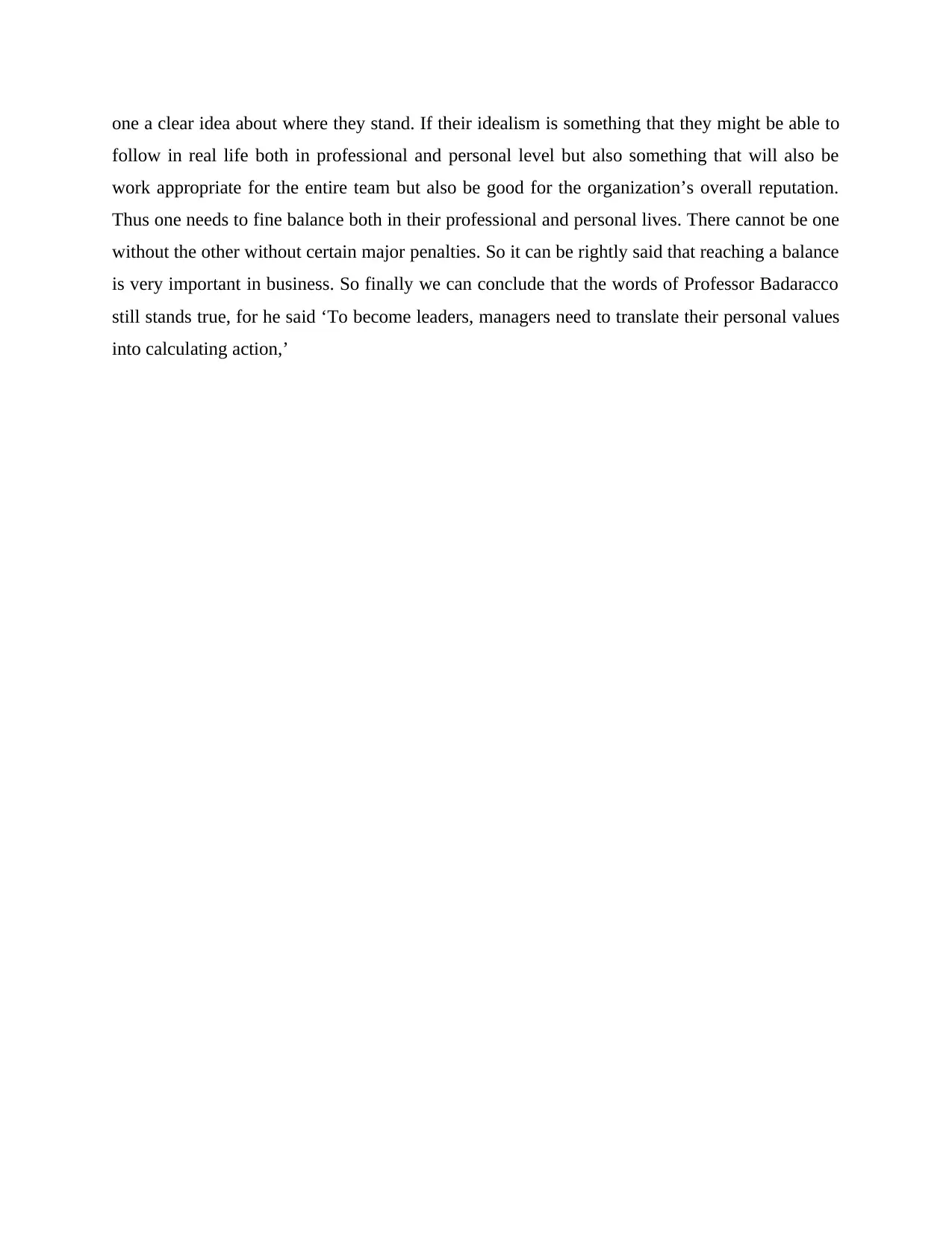
one a clear idea about where they stand. If their idealism is something that they might be able to
follow in real life both in professional and personal level but also something that will also be
work appropriate for the entire team but also be good for the organization’s overall reputation.
Thus one needs to fine balance both in their professional and personal lives. There cannot be one
without the other without certain major penalties. So it can be rightly said that reaching a balance
is very important in business. So finally we can conclude that the words of Professor Badaracco
still stands true, for he said ‘To become leaders, managers need to translate their personal values
into calculating action,’
follow in real life both in professional and personal level but also something that will also be
work appropriate for the entire team but also be good for the organization’s overall reputation.
Thus one needs to fine balance both in their professional and personal lives. There cannot be one
without the other without certain major penalties. So it can be rightly said that reaching a balance
is very important in business. So finally we can conclude that the words of Professor Badaracco
still stands true, for he said ‘To become leaders, managers need to translate their personal values
into calculating action,’
Paraphrase This Document
Need a fresh take? Get an instant paraphrase of this document with our AI Paraphraser
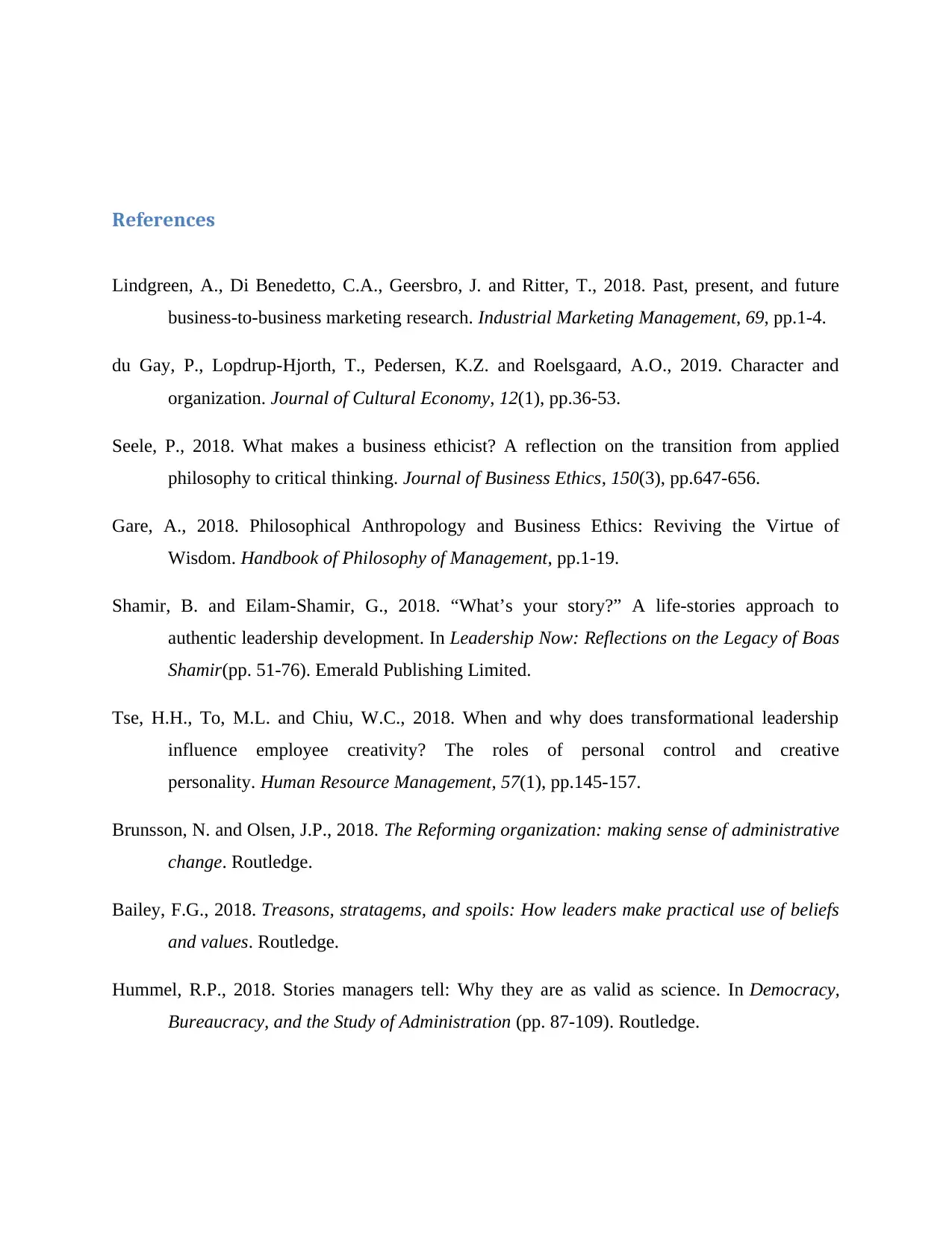
References
Lindgreen, A., Di Benedetto, C.A., Geersbro, J. and Ritter, T., 2018. Past, present, and future
business-to-business marketing research. Industrial Marketing Management, 69, pp.1-4.
du Gay, P., Lopdrup-Hjorth, T., Pedersen, K.Z. and Roelsgaard, A.O., 2019. Character and
organization. Journal of Cultural Economy, 12(1), pp.36-53.
Seele, P., 2018. What makes a business ethicist? A reflection on the transition from applied
philosophy to critical thinking. Journal of Business Ethics, 150(3), pp.647-656.
Gare, A., 2018. Philosophical Anthropology and Business Ethics: Reviving the Virtue of
Wisdom. Handbook of Philosophy of Management, pp.1-19.
Shamir, B. and Eilam-Shamir, G., 2018. “What’s your story?” A life-stories approach to
authentic leadership development. In Leadership Now: Reflections on the Legacy of Boas
Shamir(pp. 51-76). Emerald Publishing Limited.
Tse, H.H., To, M.L. and Chiu, W.C., 2018. When and why does transformational leadership
influence employee creativity? The roles of personal control and creative
personality. Human Resource Management, 57(1), pp.145-157.
Brunsson, N. and Olsen, J.P., 2018. The Reforming organization: making sense of administrative
change. Routledge.
Bailey, F.G., 2018. Treasons, stratagems, and spoils: How leaders make practical use of beliefs
and values. Routledge.
Hummel, R.P., 2018. Stories managers tell: Why they are as valid as science. In Democracy,
Bureaucracy, and the Study of Administration (pp. 87-109). Routledge.
Lindgreen, A., Di Benedetto, C.A., Geersbro, J. and Ritter, T., 2018. Past, present, and future
business-to-business marketing research. Industrial Marketing Management, 69, pp.1-4.
du Gay, P., Lopdrup-Hjorth, T., Pedersen, K.Z. and Roelsgaard, A.O., 2019. Character and
organization. Journal of Cultural Economy, 12(1), pp.36-53.
Seele, P., 2018. What makes a business ethicist? A reflection on the transition from applied
philosophy to critical thinking. Journal of Business Ethics, 150(3), pp.647-656.
Gare, A., 2018. Philosophical Anthropology and Business Ethics: Reviving the Virtue of
Wisdom. Handbook of Philosophy of Management, pp.1-19.
Shamir, B. and Eilam-Shamir, G., 2018. “What’s your story?” A life-stories approach to
authentic leadership development. In Leadership Now: Reflections on the Legacy of Boas
Shamir(pp. 51-76). Emerald Publishing Limited.
Tse, H.H., To, M.L. and Chiu, W.C., 2018. When and why does transformational leadership
influence employee creativity? The roles of personal control and creative
personality. Human Resource Management, 57(1), pp.145-157.
Brunsson, N. and Olsen, J.P., 2018. The Reforming organization: making sense of administrative
change. Routledge.
Bailey, F.G., 2018. Treasons, stratagems, and spoils: How leaders make practical use of beliefs
and values. Routledge.
Hummel, R.P., 2018. Stories managers tell: Why they are as valid as science. In Democracy,
Bureaucracy, and the Study of Administration (pp. 87-109). Routledge.
1 out of 5
Related Documents
Your All-in-One AI-Powered Toolkit for Academic Success.
+13062052269
info@desklib.com
Available 24*7 on WhatsApp / Email
![[object Object]](/_next/static/media/star-bottom.7253800d.svg)
Unlock your academic potential
Copyright © 2020–2025 A2Z Services. All Rights Reserved. Developed and managed by ZUCOL.





